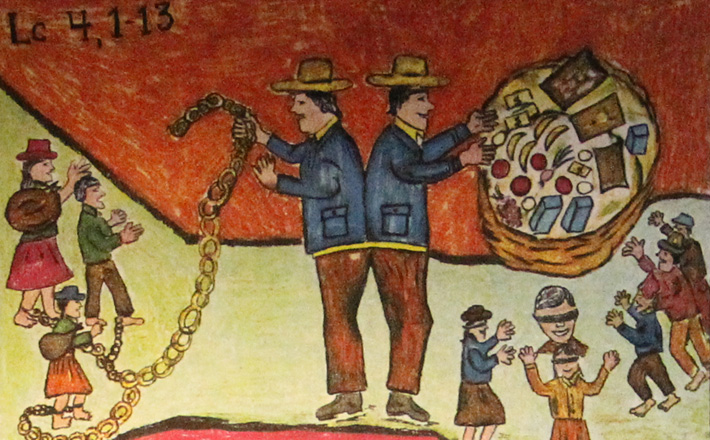Commentary on Deuteronomy 26:1-11
The book of Deuteronomy records the orations Moses declared to the Israelites on the last day of his life.
His speeches tend to dwell upon: 1) the covenant that God had established with the Israelites in the wilderness; 2) the laws of that covenant, and 3) the emphatic necessity of obedience to those laws as the condition for enjoying the benefits of the covenant.
Today’s lesson is found near the end of the longest of these speeches (chapters 5-26). Here Moses revisits instructions for the celebration of the Feast of Weeks, which he first announced in chapters 16:9-12. The Israelites were to celebrate the first harvest in June “by giving a freewill offering in proportion to the blessings the Lord your God has given you” (16:10 NRSV). Now, in chapter 26, Moses provides the actual liturgy for that first-fruits celebration ritual.
As a liturgy, our lesson includes instructions for certain prescribed actions and words specific to this annual ritual occasion.
Actions: We can picture here the worshiping Israelite standing in the Yahweh-sanctuary, holding a basket filled with yield from the harvest. As the priest receives the basket and lays it down in front of the altar, we can hear the worshiping Israelite offer the liturgical recitation along with the first fruits.
Words: The recitation reviews the saving actions of God, reaching back through the story of the ancestors:
- their initial homelessness (“A wandering Aramean was my father”);
- their migration to Egypt (“lived there as an alien”);
- their suffering there (“treated us harshly and afflicted us”);
- their cry to God for redemption (“we cried to the Lord, the God of our ancestors”);
- their redemption out of enslavement (“the Lord brought us out of Egypt”);
- their settling into a fertile land (“flowing with milk and honey”).
In this combination of words and actions the first-fruits ritual liturgy offers an instructive vision of what it means to be the people of God. (We see this vision particularly if we continue to read verses 12-16, the concluding words of Moses’ long speech. More below.)
During this first-fruits ritual the worshiping Israelite holds the first-fruits of the bountiful land upon which he stands in worship. In that physical stance the worshiping Israelite is a living testimony that God has been faithful to the promise made from the very first divine encounter with the ancestors: “Go to a land I will show you, and there I will bless you” (Genesis 12:1-3). Redemption from homelessness and oppression has happened because God did what he said he was going to do (“I will deliver them from the power of the Egyptians” (Exodus 3:8).
During this ritual the worshiping Israelite identifies with the ancestors conspicuously not according to any power or glory attributed to them, but rather in their powerlessness (“afflicted us, heard our cry, brought us out”). More than anything else God does, the liturgy celebrates the faithfulness of God as it is manifest in the rescue of the powerless.
But this liturgical vision of a worshiping community does not conclude with Deuteronomy 26:11. In verses 12-16 Moses continues, without skipping a beat, to update instructions for another ritual liturgy. This time, it is the triennial tithe first announced in 14:28-29. Every three years the Israelites were to set aside a tenth of the land’s produce and deposit it locally. This was so that the powerless among them could have access to it: the resident aliens, the orphans, the widows.
The third-year tithing ritual liturgy presents a remarkable picture. According to the terms of the covenant emphasized throughout Deuteronomy, the Israelites could expect God’s blessing if they choose to be obedient to God’s Torah. The words of the tithing ritual declare that the worshiping Israelite has indeed made choices that place him in a position of obedience before God. He can therefore boldly tell God, “look down, and bless your people Israel, and the ground that you have given us, as you swore to our ancestors” (Deuteronomy 26:15 NRSV).
Our lesson from Deuteronomy, then, in its full context, offers an instructive picture for us as we aspire to be the faithful people of God.
First: we are instructed to recall that our redemption is rooted in God’s faithfulness to his word acting on behalf of the homeless (wandering Aramean), the oppressed (afflicted resident aliens), and the marginalized (orphans and widows).
Second: we are enjoined to celebrate not simply the bounty of the land, but the faithfulness of God which is the source of the bounty. Our island home Earth sustains us with its produce because God is faithful to maintain the fruitfulness of the land.
Third: we are instructed to position ourselves as channels of God’s blessing to the vulnerable and the marginalized through our obedience to his desire that we consistently share it with them.
All told, our lesson offers us a vision of imitatio Dei, the imitation of God. We confess that God has acted on behalf of the powerless and blesses them with abundance. But God acts toward for a further purpose: that the redeemed might themselves act on behalf of the powerless in the same way that God has acted, blessing them with abundance. In short, God continues to redeem the powerless, but through the agency of the people of God when they choose to be faithful.

February 14, 2016